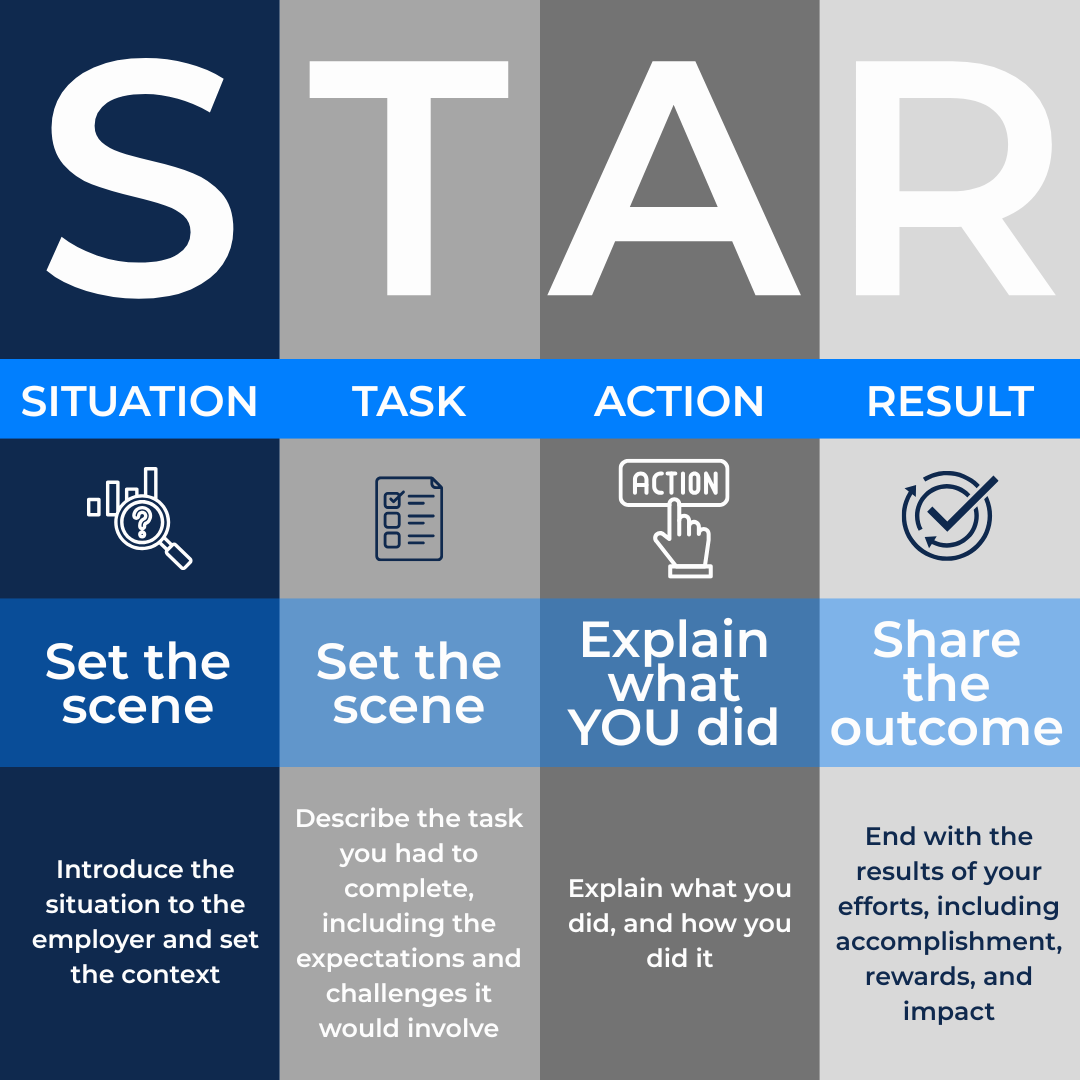Preparing for Your Job Interview: A Student's Guide
Landing a job interview is a huge step, but the real work begins when you start preparing to ace it. For students, interviews can feel daunting, especially when you have limited professional experience. The key is to leverage your academic and personal experiences to showcase your skills and potential.
Here's how to tackle common interview questions.
The STAR Method: Your Interview Superpower
For many behavioural questions (those asking you to describe a past situation), the STAR method is your best friend. STAR stands for:
- Situation: Briefly set the scene. What was the context?
- Task: What was your goal or responsibility in that situation?
- Action: What specific steps did you take to address the situation or complete the task? This is where you highlight your skills.
- Result: What was the outcome of your actions? Quantify it if possible. What did you learn?

Navigating Common Interview Questions
1. Dealing with Customers and Clients
Interviewers want to see your ability to understand and meet the needs of others, whether they are customers, clients, or even colleagues.
Your Example: You haven't provided an example for this specific question.
How to Approach It: Think about situations where you've interacted with people who had needs or expectations. This could be:
- In a part-time job (retail, food service, tutoring)
- Volunteering
- Working on a group project with specific "clients" (e.g., a student organisation you supported)
- Even helping a friend with a problem where you have to understand their perspective.
Example Scenario (STAR Format):
- Situation: "During my summer job at a local café, we frequently had long queues during peak hours, leading to customer frustration and sometimes incorrect orders."
- Task: "My goal was to improve customer satisfaction and reduce order errors during these busy periods."
- Action: "I suggested to my manager that we implement a clear, visual ordering system at the counter, similar to a 'traffic light' system for order readiness. I also trained new staff on precise order-taking techniques and encouraged proactive communication with customers about wait times."
- Result: "Within a month, we saw a noticeable reduction in customer complaints about wait times and order accuracy. "Our customer feedback scores improved by 15%, and the team felt less stressed during busy shifts due to clearer communication."
2. Working Effectively with Others
Teamwork is crucial in almost any role. Interviewers want to see how you contribute to a group's success.
Your Example: Your M.Sc. "Website Project" is an excellent example!
How to Present It (STAR Format):
- Situation: "As part of my M.Sc., our group was tasked with developing a website. Initially, we decided to use HTML for development."
- Task: "At a subsequent meeting, some team members wanted to switch to FrontPage. "My task was to help the team make the most beneficial long-term decision for our learning and the project's quality."
- Action: "I explained that while FrontPage might seem quicker, using HTML would provide us with more valuable, widely applicable coding skills. "I facilitated a discussion where I listened to their concerns about HTML's complexity, but then effectively articulated the educational advantages and career benefits of mastering HTML."
- Result: "After some discussion, I successfully convinced the other group members that utilising HTML was the advantageous approach. As a result, we developed the final submission using HTML, gaining practical skills that were far more beneficial for our future careers."
3. Achieving Objectives Under Challenging Timescales
This question assesses your resilience, planning, and problem-solving skills under pressure.
Your Example: Your dissertation experience is perfect here!
How to Present It (STAR Format):
- Situation: "During my Neuroscience Degree Dissertation, a critical piece of equipment broke right before my final experiment, leaving me with very limited time to complete my research."
- Task: "My immediate objective was to find a replacement or alternative solution to complete my research and submit my dissertation on time."
- Action: "I immediately informed my tutor, who contacted the manufacturer. Simultaneously, I proactively approached other departments to see if a replacement was available. When the manufacturer said the equipment was irreparable on-site, I leveraged my negotiation skills to explain the urgency of my situation, successfully persuading them to supply a replacement."
- Result: "My determination and proactive negotiation skills enabled me to achieve a satisfactory solution to the problem. I was therefore able to complete my research and submit my dissertation on time, ensuring my academic success."
4. Making Change Happen
Interviewers want to see your initiative, analytical thinking, and ability to implement improvements.
Your Example: Your "Medical Summariser" experience is a strong fit.
How to Present It (STAR Format):
- Situation: Whilst working as a medical summariser in a doctor's surgery, I was compiling a diabetic audit trail. "I noticed that most of the required information was being manually gathered from physical notes rather than directly from the computer system."
- Task: I wanted to find a more efficient and less laborious way to gather this information for future audits.
- Action: I identified that adding certain prompt questions directly to the computer's diabetic consultation template would streamline the process. I developed a clear proposal outlining how this would improve efficiency and reduce manual effort. I then presented this suggestion to my manager, explaining the benefits.
- Result: "My manager agreed with my suggestion, recognising it as a significant improvement. "My proactive approach led to the implementation of the new template, which has made all subsequent diabetic audits considerably less laborious and more efficient for the entire team."
5. Managing Actions Through Unforeseen Difficulties / Changing Circumstances
This question is about your adaptability, problem-solving, and perseverance.
Your Example: Your "Dissertation on Organotypic Culture technique" is excellent.
How to Present It (STAR Format):
- Situation: "During the final year of my degree, my dissertation on 'Further development upon Organotypic Culture technique' involved assessing cell death in cultures exposed to neurotoxic poisoning. This was an area not covered in depth on my course, requiring extensive independent research."
- Task: "My objective was to successfully complete this challenging research and meet my self-imposed targets despite the steep learning curve and potential unforeseen experimental issues."
- Action: "I devised a structured, yet flexible, work plan that included thorough literature research using library and internet resources. Crucially, when my initial cell cultures began dying – an unforeseen difficulty – I didn't give up. I immediately altered my procedures, redesigned experiments, re-analysed data, and applied appropriate statistical tests to draw valid conclusions. I also incorporated regular reviews of my work to catch errors early."
- Result: My determination and adaptability allowed me to overcome these challenging, unforeseen difficulties. "I successfully redesigned experiments, gathered valid data, and ultimately arrived at a successful conclusion for my dissertation, submitting it on time and achieving my academic goals."
Generic Interview Questions: Beyond STAR
While STAR is great for behavioural questions, you'll also encounter more direct questions.
Why have you applied for the role?
- Research: Show you understand the role and the company.
- Connect: Link your skills, interests, and career aspirations directly to this specific role and this specific company. Avoid generic answers.
- Passion: Convey genuine enthusiasm for the opportunity.
What skills, qualities, and attributes do you have that would make you successful in the role?
- Match: Review the job description and list 3-4 key skills they're looking for.
- Evidence: For each skill, provide a brief, specific example (STAR method in miniature) from your academic or personal experience.
- Future Focus: Explain how these skills will directly benefit the team/company in this role.
What areas of the role do you think you will find challenging?
How will you go about addressing any development areas?
What support do you think you will need?
- Honesty (with a twist): Don't say "nothing" or list a critical weakness. Choose something that is a learning opportunity rather than a fundamental flaw.
- Proactive Solution: Immediately follow up with how you plan to overcome this challenge (e.g., "I'm eager to learn [new software/process]. I'm a fast learner and plan to [take an online course/seek guidance from colleagues].").
- Growth Mindset: Show you're keen to learn and develop.
What do you know about this area of business?
What do you know about the initiatives or key projects taking place?
- Research, Research, Research! This is non-negotiable.
- Company Website: Explore their "About Us," "News," "Projects," or "Careers" sections.
- Recent News: Search for recent articles about the company or industry.
- Specifics: Mention specific projects, values, or recent achievements. This shows genuine interest.
Equity, Diversity, and Inclusion (EDI) Questions
These questions assess your awareness, empathy, and commitment to creating an inclusive environment.
When have you witnessed discriminatory/x/y/z behaviour – what did you do?
Focus on Action: If you have a personal experience, describe it briefly and then focus on your proactive, appropriate response.
Safe Environment: Emphasise creating a respectful and inclusive environment.
Bystander Intervention: Talk about how you would safely intervene or report.
-
What would you do if you experienced a colleague acting in a discriminatory way against you or other people?
-
What would you say to them? What further action would you take?
-
Can you give an example of a similar situation in the past where a colleague was acting in a non-inclusive way?
-
What did you do?
Direct & Calm Communication: State you would address the behaviour directly but respectfully with the colleague first, explaining the impact.
Escalate if Necessary: If the behaviour continues or is severe, state you would report it to a manager, HR, or relevant authority.
Support System: Mention supporting those affected.
Past Example: Use a mild example from your experience (e.g., someone making an insensitive joke in a group project, and how you subtly redirected the conversation or spoke to them privately). Focus on how you handled it constructively.
-
When have you proactively sought out new ideas or ways of working in order to improve?
-
Why was this important?
-
What did you learn /find out?
-
What was the outcome?
-
How do you ensure to update your thinking continuously?
Your "Medical Summariser" example fits perfectly here.
Proactive Learning: Discuss how you stay current (industry news, online courses, networking, reading).
Continuous Improvement: Emphasise that you view learning as an ongoing process to remain effective and innovative.
Solving Problems Questions
These questions test your analytical skills and decision-making process.
-
When have you been responsible for analysing data and information to help inform a key business decision?
-
What did your analysis reveal?
-
What analytical techniques did you use?
-
What recommendations did you make based on the analysis?
-
How did it help the final decision?
Your dissertation experience (analysing cell death data, using statistical tests) is a strong fit.
For "business decision": If you don't have direct business experience, think about academic projects where your analysis led to a particular conclusion or recommendation.
Be Specific: Mention the type of data, tools used (Excel, statistical software, specific models), and what your findings showed.
Customer-Driven Questions
Even if your role isn't customer-facing, this speaks to understanding user needs and continuous improvement.
-
What have you done recently to update your knowledge of internal and/or external best practice or insight?
-
Where do you look for new insight/information?
-
How have you applied this insight or best practice at work?
-
How did you share your learning with others?
Proactive Learning: Similar to the EDI question, discuss how you stay informed (industry blogs, webinars, academic journals, professional organisations, online courses).
Application: Show how you've taken new knowledge and applied it to your studies or previous roles (e.g., learning a new coding technique for a project, applying a new research methodology).
Sharing: Mention how you share insights (e.g., discussed with project team, contributed to group notes, presented findings).
Final Tips for Success
- Practice, Practice, Practice: Rehearse your answers out loud.
- Research the Company and Role: Tailor your answers to their needs.
- Prepare Your Questions: Always have 2-3 thoughtful questions to ask the interviewer at the end. This shows engagement.
- Dress Appropriately: Look professional.
- Be Punctual: Arrive early for in-person interviews, or log on early for virtual ones.
- Send a Thank-You Note: A polite email after the interview is always a good idea.
By preparing thoroughly and practising your responses, you'll feel more confident and be better equipped to showcase your best self in any job interview! Good luck!






